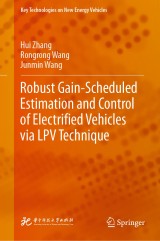Details

Robust Gain-Scheduled Estimation and Control of Electrified Vehicles via LPV Technique
Key Technologies on New Energy Vehicles
|
149,79 € |
|
| Verlag: | Springer |
| Format: | |
| Veröffentl.: | 10.06.2023 |
| ISBN/EAN: | 9789811985096 |
| Sprache: | englisch |
Dieses eBook enthält ein Wasserzeichen.
Beschreibungen
This book presents techniques such as the robust control and nonlinearity approximation using linear-parameter-varying (LPV) techniques. Meanwhile, the control of independently driven electric vehicles and autonomous vehicles is introduced. It covers a comprehensive literature review, robust state estimation with uncertain measurements, sideslip angle estimation with finite-frequency optimization, fault detection of vehicle steering systems, output-feedback control of in-wheel motor-driven electric vehicles, robust path following control with network-induced issues, and lateral motion control with the consideration of actuator saturation. This book is a good reference for researchers and engineers working on control of electric vehicles.
Chapter 1. Polytopic LPV approaches for intelligent automotive systems_state of the art and future challenges.- Chapter 2. H∞ observer for LPV systems with uncertain measurements on scheduling variable application to an electric ground vehicle.- Chapter 3. Sideslip angle estimation of an electric ground vehicle via finite-frequency H∞ approach.- Chapter 4. Active steering actuator fault detection for an automatically steered electric ground vehicle.- Chapter 5. Robust H∞ output-feedback yaw control for in-wheel motor driven electric vehicles with differential steering.- Chapter 6. Robust H∞ path following control for autonomous ground vehicles with delay an data dropout.- Chapter 7. Robust lateral motion control of four-wheel independently actuated electric vehicles with tire force saturation consideration.
<p>Hui Zhang received the B.Sc. degree in mechanical design manufacturing and automation from the Harbin Institute of Technology at Weihai, China, in 2006; the M.Sc. degree in automotive engineering from Jilin University, Changchun, China, in 2008; and the Ph.D. degree in mechanical engineering from University of Victoria, Victoria, BC, Canada, in 2012. Dr. Zhang was a research associate at the Department of Mechanical and Aerospace Engineering of the Ohio State University, Columbus, Ohio, USA. His research interests include advanced control methods, vehicle dynamics and control, mechatronics, robust control and filtering, networked control systems, and signal processing.</p><p></p>Rongrong Wang received B.E. degree in control science and engineering from Tianjin University, Tianjin, China, and the B.S. degree in economics from Nankai University, Tianjin, in 2006; the M.S. degree in control science and engineering from Tsinghua University, Beijing, China, in 2009; and the Ph.D. degreein mechanical engineering from the Ohio State University, Columbus, OH, USA, in 2013. He is currently an associate professor in the School of Mechanical Engineering, Shanghai Jiao Tong University, Shanghai, China. His research interests include nonlinear systems control, fault-tolerant control, and vehicle dynamics and control.<p></p>Junmin Wang received the B.E. degree in automotive engineering and the M.S. degree in power machinery and engineering from Tsinghua University, Beijing, China, in 1997 and 2000, respectively; the M.S. degrees in electrical engineering and mechanical engineering from University of Minnesota Twin Cities, Minneapolis, MN, USA, in 2003; and the Ph.D. degree in mechanical engineering from the University of Texas at Austin, Austin, TX, USA, in 2007. Dr. Junmin Wang is the Accenture endowed professor in Mechanical Engineering at University of Texas at Austin. In 2008, he started his academic career at Ohio State University, where he founded the vehicle systems and control laboratory, was early promoted to an associate professor in September 2013, and then promoted to a full professor in June 2016. He also gained five years of full-time industrial research experience at Southwest Research Institute (San Antonio, Texas) from 2003 to 2008. Prof. Wang has a wide range of research interests covering control, modeling, estimation, optimization, and diagnosis of dynamical systems, especially for automotive, smart and sustainable mobility, human–machine, and cyber-physical system applications<p></p><p></p><p></p>
This book presents techniques such as the robust control and nonlinearity approximation using linear-parameter-varying (LPV) techniques. Meanwhile, the control of independently driven electric vehicles and autonomous vehicles is introduced. It covers a comprehensive literature review, robust state estimation with uncertain measurements, sideslip angle estimation with finite-frequency optimization, fault detection of vehicle steering systems, output-feedback control of in-wheel motor-driven electric vehicles, robust path following control with network-induced issues, and lateral motion control with the consideration of actuator saturation. This book is a good reference for researchers and engineers working on control of electric vehicles.
Combines control and automotive expertise from an interdisciplinary standpoint Introduces a control-oriented modeling technology for nonlinear vehicle dynamics Provides valuable guidance for independent-driven vehicle design and further performance improvement
Diese Produkte könnten Sie auch interessieren:

Neutron Applications in Earth, Energy and Environmental Sciences

von: Liyuan Liang, Romano Rinaldi, Helmut Schober

149,79 €

Nanobioelectronics - for Electronics, Biology, and Medicine

von: Andreas Offenhäusser, Ross Rinaldi

96,29 €














